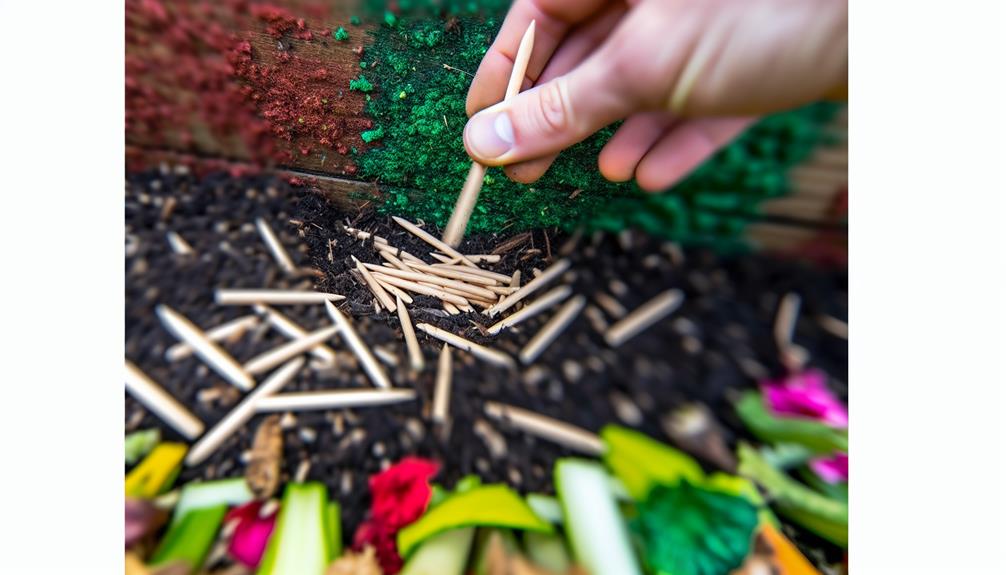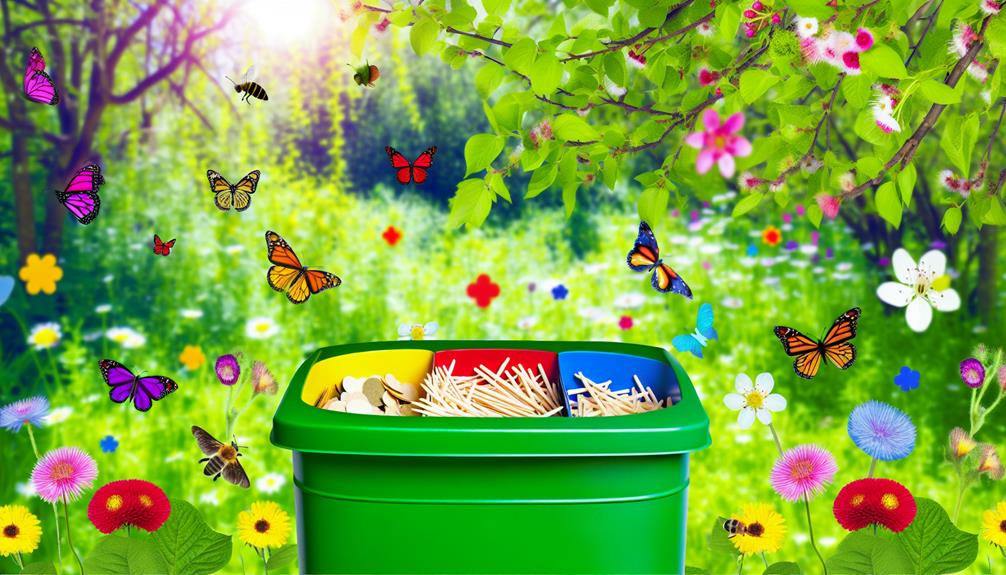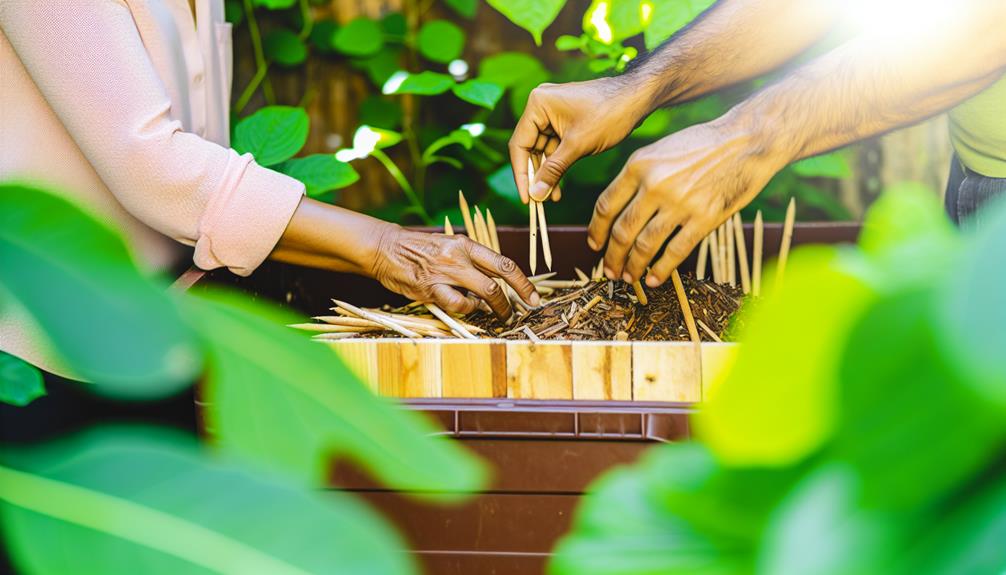

Yes, you can compost wooden and bamboo toothpicks. Break them into smaller pieces to speed up decomposition. Make sure your compost pile is moist and well-aerated by turning it regularly. This accelerates the breakdown process. Wooden and bamboo toothpicks are biodegradable and environmentally friendly, reducing waste and enriching your compost with organic material.
Remember, composting toothpicks also helps decrease methane emissions from landfills and supports responsible forest management. To maximize their eco-friendliness, try to use sustainably sourced or bamboo toothpicks. Continue to learn about composting best practices and make the most of your organic waste.
When considering composting toothpicks, it’s essential to understand the different materials they’re made from. Toothpicks come in a variety of types, but the most common ones are made from wood or bamboo. Wooden toothpicks are typically crafted from birch or other hardwoods, while bamboo toothpicks are a sustainable alternative due to bamboo’s rapid growth rate.
Understanding the production process of these toothpicks can help you make informed decisions. Wooden toothpicks are produced by cutting the wood into small sections, steaming them to make the wood pliable, and then shaping and polishing them to the desired size. This process often includes bleaching and chemical treatments, which can affect their compostability.
On the other hand, bamboo toothpicks are made by cutting bamboo into thin strips and then shaping them into toothpicks, usually without the need for harsh chemicals.
Also Read: Can You Compost Branches?
Now that you know the materials and production processes, let’s explore how to compost toothpicks effectively. First, make sure your composting conditions are ideal. Toothpicks, being small and wooden, have a moderate decomposition rate but can break down faster under the right conditions.
Here’s a quick guide to help you get started:
| Step | Description |
|---|---|
| Preparation | Break the toothpicks into smaller pieces to increase surface area. |
| Moisture | Keep your compost pile moist but not waterlogged. Aim for a damp sponge feel. |
| Aeration | Turn your compost pile regularly to supply oxygen and speed up decomposition. |
Toothpicks are organic material, so they’ll decompose given enough time. Make sure to balance green (nitrogen-rich) and brown (carbon-rich) materials in your compost pile. Toothpicks fall under the brown category, so pair them with kitchen scraps or grass clippings for best results.
Monitor the decomposition rate by checking the pile every few weeks. When the toothpicks become soft and start breaking apart easily, you’re on the right track. Composting might take several months, but with patience and proper care, you’ll create nutrient-rich compost for your garden. By following these steps, you’ll contribute to a sustainable and eco-friendly lifestyle.
Also Read: Can You Compost Black-Eyed Peas?
Composting toothpicks noticeably reduces waste and supports a healthier environment by returning organic material to the soil. By composting, you’re actively participating in a cycle that minimizes the environmental footprint. Toothpicks, often made from wood, decompose naturally, enriching the soil with nutrients important for plant growth.

When considering the environmental impact, wood sourcing is essential. Toothpicks made from sustainably sourced wood help guarantee forests are managed responsibly. By choosing toothpicks from certified sources, you support practices that maintain biodiversity and forest health. Composting these toothpicks ensures you’re not contributing to landfill waste, which is a significant step in reducing your environmental footprint.
Additionally, composting wood-based toothpicks means you’re avoiding the release of methane—a potent greenhouse gas—produced when wood decomposes anaerobically in landfills. By integrating toothpicks into your compost, you help reduce methane emissions, contributing to a smaller carbon footprint.
To maximize your environmental impact, make sure to break or cut toothpicks into smaller pieces before composting. This accelerates decomposition and helps the composting process.
Also Read: Can You Compost Body Wash?
Exploring toothpick alternatives can greatly enhance your eco-friendly efforts while providing practical and sustainable options. By switching to eco-friendly substitutes, you reduce waste and contribute to a healthier planet.
One popular alternative is the bamboo toothpick. Bamboo grows quickly and is biodegradable, making it a more sustainable choice.
Another option is reusable picks. These picks, often made from stainless steel or durable plastic, can be used multiple times. After each use, just rinse and store them for next time. Not only do they cut down on waste, but they also save you money in the long run.
For those who prefer natural options, consider using biodegradable wooden skewers or even twigs from non-toxic trees. These can be composted after use, ensuring minimal environmental impact.
Additionally, there are toothpicks made from cornstarch or other plant-based materials. These decompose more quickly than traditional wooden toothpicks, providing another eco-friendly substitute.
Also Read: Can You Compost Celery?
When it comes to disposing of your toothpicks and their alternatives, selecting the right method guarantees you’re maintaining an eco-friendly lifestyle. Proper disposal not only enhances toothpick hygiene but also assures disposal convenience. Here’s a breakdown of the best methods to manage your toothpick waste:

| Disposal Method | Toothpick Type | Eco-Friendliness |
|---|---|---|
| Composting | Wooden Toothpicks | High |
| Trash Bin | Plastic Toothpicks | Low |
| Recycling Centers | Metal Toothpicks | Moderate |
| Biodegradable Bin | Bamboo Toothpicks | High |
Wooden Toothpicks: Compost them if they’re free from any chemicals or coatings. They’ll break down naturally, adding valuable nutrients to your compost pile.
Plastic Toothpicks: These should go in the regular trash bin. Unfortunately, they don’t biodegrade and contribute to long-term waste.
Metal Toothpicks: Drop them off at recycling centers. They can be melted down and reused, reducing overall waste.
Bamboo Toothpicks: Much like wooden ones, composting is the best option. Bamboo decomposes efficiently, making it a highly eco-friendly choice.
Colored toothpicks aren’t safe for composting. Toothpick dyes may contain harmful chemicals that can impact your compost. Stick to plain, untreated toothpicks to guarantee your compost remains chemical-free and environmentally friendly.
Flavored toothpicks might affect your compost quality. The flavoring chemicals can alter compost acidity, potentially harming beneficial microbes. Stick to plain toothpicks to keep your compost healthy and contribute positively to your community’s sustainability efforts.
Toothpick decomposition in compost can take several months to a year. You can speed up compost breakdown by breaking them into smaller pieces. You’ll see faster results and feel good about contributing to a sustainable community.
When considering bamboo toothpicks, you’ll find they’re often better for composting due to sustainable bamboo sourcing. Wooden toothpicks, though also compostable, might not match bamboo’s quick growth and renewability, enhancing your eco-friendly efforts.
Yes, toothpicks can attract pests in a compost bin. To prevent this, incorporate pest deterrents and maintain proper compost care. By doing so, you’ll keep your compost healthy and maintain a welcoming environment for all eco-enthusiasts.
To conclude, you can compost wooden toothpicks if they’re untreated and free of food residue. Break them into smaller pieces to speed up decomposition. Be cautious with plastic or flavored toothpicks; they don’t belong in compost.
By composting correctly, you’re reducing waste and enriching your soil. Consider alternatives like bamboo or reusable picks for better environmental impact.
When disposal is necessary, choose composting for wooden picks and proper recycling for other materials.
